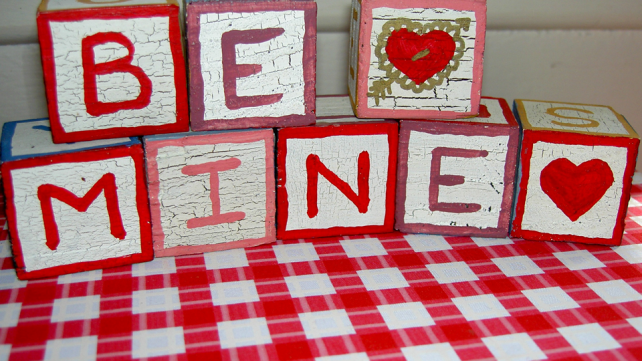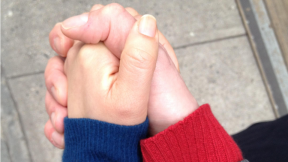
Candlelit dinners. Champagne. Diamonds. Roses. Imported Chocolates.
NOTE TO MEN: If you haven't planned or purchased something from this list, you're likely going to have a horrible night this Feb. 14th (and one without any lovemaking). Why? Blame it on romantic fantasy. It starts long before our first Valentine's purchase or our first kiss. We've heard "happily-ever-after" fairy tales since kindergarten. We've grown up viewing "diamonds-are-forever" commercials.
As adults, we experience the commercialization of Valentine's Day as a day of great expectations, and just as often, great disappointments when our beloved's gift-giving (or lack thereof) doesn't support our romantic dreams.
Mind you, I've bought my share of romantic gifts and loved doing so-I am a happily married man of 18 years and a couples' therapist for over 20. I am certainly not against gift giving, but if either a wife or a husband equates the big gift with a big heart, then we are defining the quality of our love by material expectation. In doing so, we risk creating a deep emotional rift in what may otherwise be a healthy, loving relationship.
In 1979, Ted Huston, a psychology professor at the University of Texas, began following 168 married couples for fourteen years to see what factors were present in successful long-term marriages. One significant discovery: Couples who entered their relationship with high expectations were far more likely to experience conflict and disenchantment through the years.
Huston concluded that the greatest foundation for couples is of all things friendship. Couples who kept their expectations realistic and concentrated more on positive interactions created enduring happy marriages.
But what's friendship got to do with romance? And why is friendship with our spouse important on Valentine's and every day of the year? What I have seen in my own marriage, and time and time again in the couples I work with in my private practice, is that long-term love is sustained not by romance alone but by the daily activities of following-through on promises, showing up both emotionally and physically when needed, owning up to responsibility for your part in any conflict, and by being the kind of person who is worthy of being loved. All of the above is the definition of being a friend. One of the true secrets to long-lasting marriages is that friendship amongst couples can deepen when each party acknowledges that there is work to be done on themselves and in how they treat each other.
I remember early in my marriage when my wife gave me a very generous Valentines Day gift. After expressing my thanks, but also discomfort at the over-the-top nature of the gift, she said to me "But I want to make you happy." I said, "It's not your responsibility to make me happy, that's my job." She was stunned and relieved at the same time. Feeling like we must make our mate happy is a tremendous weight to carry and many a Valentine is based on that premise. Valentine's Day is a celebration, not a responsibility. If we can carry that in our hearts and make each day a special Valentine by being loving, kind and concerned about one another, then we are actively creating true love.
With a "best-friends" vision for marriage, we will not lose our connection to our romantic life. But that's not so easy to accomplish. We must learn and understand what makes our relationship strong and what weakens it (like great expectations on Valentine's Day). In my new book, Love-Making from The Inside Out: Transform Complaints, Criticism, and Conflict into a Loving Relationship, I write that many defenses come into play during difficulties and conflicts. Conflict is normal but our ability to resolve difficulties without alienating our partner is one major step to long-term romance. The most common form of alienation lies in being defensive when our partner is trying to tell us how they feel.
Be on the lookout for these top romance-killers and common statements frequently said during arguments:
Globalization--"Everybody Does That"
Blame-Shifting--"And you do the same thing but worse."
The Victim--"I'm so good to you, and you treat me so badly."
Gas-lighting--"I was just kidding; Can't you take a joke?"
Entitlement--"You are the one who made me angry; You deserve it.
Denial--"I'm not angry."
Displacement--"Just because you had a bad day at work, don't take it out on me."
Guilt--"I work my ass off to give you everything and you can't even make me some tea."
Shame/Blame: "You are a human slug; you never do anything."
Stonewalling: "This is the way I am, take it or leave it."
Projection: "You think I'm stupid, don't you?"
Devaluation: "You really could lose some of that extra weight."
One of the most common reasons for divorce is the inability to accept influence from our mate. Acknowledging our partner is the most potent force for Valentine's success. To not defend ourselves, but instead hear what is being said, and then be able to express our understanding through acknowledgement will beat a box of chocolates any day.
How can we distinguish between realistic expectations and romantic ideals? Understand this foundation for realistic romance: Central to every couple's Valentine's wishes is embracing the reality of what it takes to make a relationship work over the long haul. Before an act of romance, in either giving or receiving, ask yourself the question, "Is this going to help sustain my relationship over time or not? If the answer is yes, you're in the realistic expectations spectrum. If it's no, you're living in romantic ideals la-la land.
And so, just what are realistic expectations on Valentine's Day and beyond? We can expect to be treated with respect, common courtesy, kindness, understanding, compassion and empathy. Expect the common courtesies, the helping hand, being reasonable, fair, open and emotionally connected, all of which are primary ingredients of true romance. When I speak to women in therapy about love, what they say is it's not so much hearts and flowers as it is about someone they can depend on. A good sense of humor, anger management, and a positive attitude trump romantic ideals every time.
At any Valentine's Day, it is not how much loot we come up with but how we treat one another that will save our experiences on Feb. 14th -and our relationships. Respect cannot be bought, and it's the same with friendship. Our ability to be kind, empathic, compassionate and tender will determine the strength and durability of our relationship over time. Relationship success is inevitably linked to our knowledge of what we truly need from one another and each party having made peace with our own fantasy expectations.
ANOTHER NOTE TO MEN: Interestingly enough, Ted Huston found that men who exhibited what were termed "feminine" traits were more often successful in their marriages. It appears that positive behaviors like nurturing, tenderness, and sweetness actually do work.
In the final analysis, enduring love does not solely lie in gift giving or in the lovey-dovey cooing and ogling between lovers. More often love is the result of the small things of every day life. That said, a rose in your teeth, a song in your heart and breakfast in bed is not a bad start to Feb. 14th or any other morning.
For more information on Dr. Bill Cloke's work with couples, visit www.billcloke.com






Add new comment